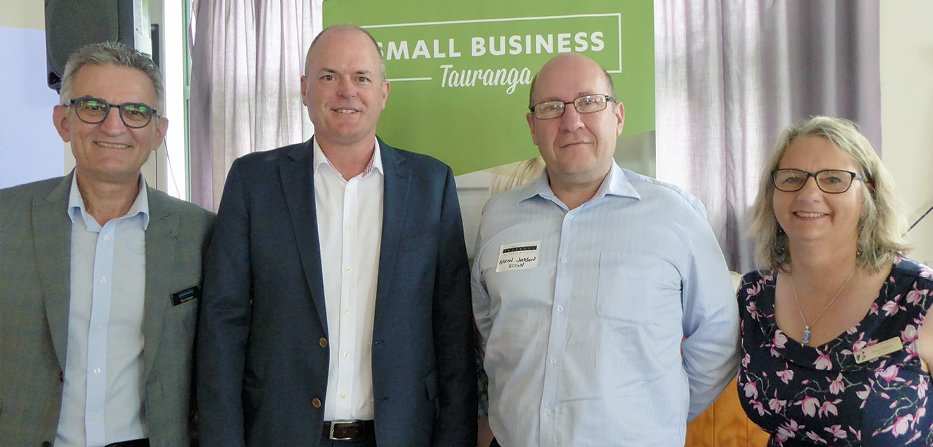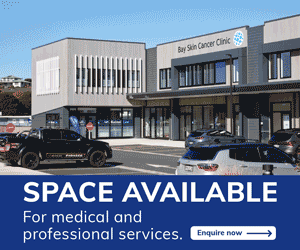Bay of Plenty MP Todd Muller recently delivered his fifth annual address at the Welcome Bay Business Breakfast. This is an edited version of his speech, which traverses a range of political and economic challenges politicians can expect to face this year.
Last year I said that in 12 months we would have a better idea of the capacity of the incoming Labour/NZ First/Green Government.
I think we can now see it is clear they weren’t ready, hadn’t done the work over the previous nine years to develop a clear vision and plan, and have largely limped through the first 12 months.
They survive only with the help of the bureaucracy.
Most ministers are out of their depth, when pressed for achievements they talk largely of process, when tasked for a vision, they just repeat pleasant banalities.
Three examples. Firstly, the economy.
Rather than genuinely adjusting the tax threshold so it reflects increasing wages, they cancelled National’s planned tax threshold adjustments, prioritize workplace reform at a time when we are close to full employment, and plan a wellbeing budget.
With respect to the planned wellbeing budget, I agree that too many of our young people do not have the opportunity that I had, have mental health challenges that are not adequately supported, that we need to do more to support families to have a stable roof over their head, and break the cycle of drug addiction and violence.
But what matters is what actually gets achieved, not words of feelings, kindness, empathy and wellness. but actual public sector outcomes.
We had nine years of demanding, unyielding “Better Public Service” targets to measure actual performance.
This government has scrapped them. They had a1000 homes a year target for Kiwibuild. Scrapped.
Second, the government’s approach to our most significant trading relationship, China, is inept and clueless.
Over 15 months in and we still have not had comprehensive dialogue with their senior ministers.
After nine years of deep personal relationships, from which challenging issues could be managed, we now have at best awkwardness, at worst emerging suspicion.
As Prime Minister, there are few more critical tasks than managing this strategic relationship for our benefit.
Third, the decision to end offshore oil and gas exploration. A political horse trade for support for NZ racing and waka jumping and the opportunity to have something to anchor the PM’s first overseas trip.
This decision increases our sovereign risk, doesn’t reduce our emissions, and increases risks for our energy supply.
It has removed the opportunity for NZ to participate in export opportunity to assist carbon intensive energy countries to transition to gas.
New leadership
The National Party too has had a year that was not envisaged 12 months ago. We had the departure of our leader Bill English, a man of huge political stature.
We had the emergence of Simon Bridges as he made the move from competent young minister to National Party leader.
For me personally, there was grappling with the broader challenges of climate change and repositioning our party to be the leader on serious and intelligent environmentalism in New Zealand.
I have been a proud member of the New Zealand National Party for over 30 years. I heard a voice being given to values of hard work, entrepreneurship, personal responsibility, strong families and community empathy and service.
These values were the same that my parents and grandparents lived by here in the Bay.
It is the promotion of these values that draws a clear line of distinction between the National Party and others.
I grew up in Te Puna, straddling the urban rural divide – but the divide was much smaller back in those days. Straddling that divide has in many ways become a theme of my career as I navigated the world of agri-business at Apata, at Zespri, and then finally as an executive at Fonterra.
What those roles taught me was the power that comes from previously disconnected stakeholders pulling together to create something larger than their own self-interest.
Before my corporate career, I was employed as a junior staffer for Prime Minister Jim Bolger.
I can’t help but draw some similarities between Bolger’s leadership and what is ahead of National today.
Bolger became the National Party leader in March 1986, 20 months after National’s defeat in July 1984. He came to the leadership on the tails of Rob Muldoon’s Third National Government.
In his first year in Opposition, Bolger was polling at seven percent to David Lange’s 36 percent.
Bolger went on to win three consecutive elections – 1990, 1993, and 1996. Seldom did he ever poll ahead of his Labour Party counterpart in the Preferred Prime Minister polls.
Drawing on caucus
National won those elections not because of the popularity of the leader, but because Bolger knew how to build a team of highly competent qualified and experienced people around him.
He had a talented caucus, a deep bench – and he knew how to use it.
In 1996 everything changed with the introduction of the first MMP election. Bolger was up against the formidable Helen Clark.
And just as he had done within the National Party, Bolger won his third term because he knew the importance of relationships and being able to reach across the political divide to pull together coalitions.
This is what MMP requires. You need to be able to bring people together, repair burnt bridges, keep doors open, be flexible and pragmatic, and yet still be able to steer a clear direction, focusing on the things that are most important to your vision and dropping those at the periphery.
You need to look beyond political convenience to what is best for the country.
These are the lessons I learned from Bolger.
That’s why – as a result of Simon Bridges reaching out to the prime minister to say the Opposition was willing to consider a bipartisan approach to climate change – I am working closely with Green Party leader James Shaw.
We have been given a broad mandate by both the Prime Minister and the Leader of the Opposition.
Together, we must ensure the legislation is workable and in the best interests of the country. I think we’ll get there.
Increasingly, I believe New Zealanders want clear direction, but less partisanship and petty pugilism.
They want to see better outcomes for themselves and their families.
They want to see solutions to our most challenging systemic problems that are best served by considered debate and reflection.
We should seek out greater opportunities to work together, build consensus, and unite behind issues that could, and arguably should, be above day to day adversarial politics.
We might not be able to agree on all of the smallest details, but in the interests of New Zealand we should at least have the same high level direction of travel.
However, we cannot and will not work with the government on everything.
There are areas where we need to draw a line in the sand and really fight our corner. You see that with our clear delineation on tax, law and order, infrastructure and transport.
As an Opposition we need to have a relentless focus on the things that actually matter to kiwi families – the things that make a difference in their lives. Just as in the late 1980s, National has a talented caucus and a deep bench, who are capable and willing to work with the government when we can – and prosecute the case against them when we can’t.
We should not be concerned about the daily media’s fixation on today’s preferred prime minister polls.
In 2018, the caucus chose Simon Bridges as our leader and candidate for Prime Minister, whether that is in a National majority government or a National-led Coalition.
He will be a great Prime Minister.
For the rest of the team, our role now is to assist the leader to demonstrate seriousness of purpose, strength in diversity, strength in competence, strength in coherence.
The public need to see beyond a single voice and hear the collective voice of
experience.


















